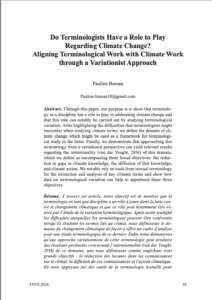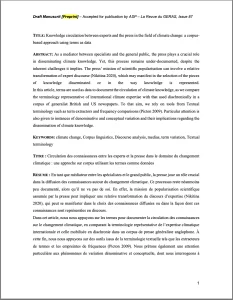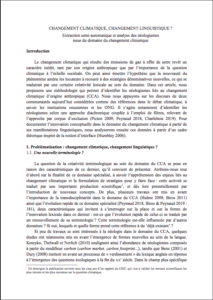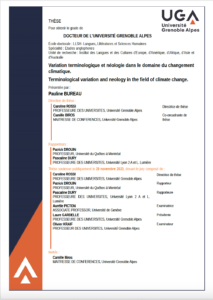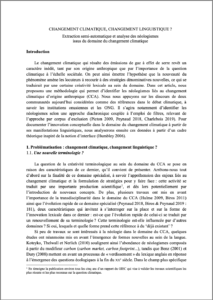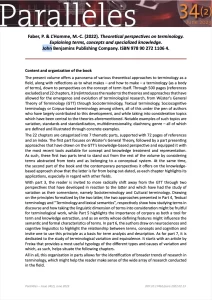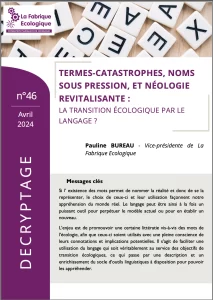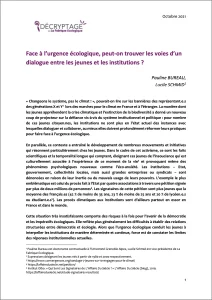ACADEMIC
Do Terminologists Have a Role to Play Regarding Climate Change? Aligning Terminological Work with Climate Work through a Variationist Approach | TOTh 2024 | 2025
After highlighting the difficulties that terminologists might encounter when studying climate terms, I argue that approaching this terminology from a variationist perspective can yield relevant results regarding the intentionality of this domain, which I define as encompassing three broad objectives: the reduction in gaps in climate knowledge, the diffusion of that knowledge, and climate action. Relying on tools from textual terminology for the extraction and analysis of key climate terms, I show how data on terminological variation can help to apprehend these three objectives.
Knowledge Circulation between Experts and the Press in the Field of Climate Change: a Corpus-based Approach Using Terms as Data | ASp | 2024
I use terms as data to document the circulation of climate knowledge, as I compare the terminology representative of international climate expertise with that used diachronically in a corpus of generalist British and US newspapers. To that aim, I rely on tools from Textual terminology, such as term extractors and frequency comparisons (Picton 2009). Particular attention is also given to instances of denominative and conceptual variation and their implications regarding the dissemination of climate knowledge.
Climate Knowledge or Climate Debate? Using Word Embeddings and Critical Discourse Analysis to Compare Expert and Media Representations of Climate Knowledge | Terminology | 2024
I compare the meaning climate experts and the media give to terms pertaining to climate change in English discourses and determine whether potential cotextual variation in the discourses produced by these two communities has ideological implications. I use the deep learning algorithm Word2vec to identify terms whose cotext of occurrence is prone to high variability, depending on whether it is included in a newspaper corpus on climate change or one composed of reports from intergovernmental organizations.
Variation terminologique et néologie dans le domaine du changement climatique | PhD thesis | 2023
This thesis offers a characterization of terminological variation and neology around the topic of Anthropopogenic Climate Change (ACC), taking into account the role and implications of these two linguistic phenomena in relation to climate objectives. What is at stake is a better understanding of the role that terms, on the one hand, and terminology as a discipline, on the other hand, can play in addressing the climate issue.
Changement climatique, changement linguistique ? Extraction semi-automatique et analyse des néologismes issus du domaine du changement climatique | Neologica | 2022
The unprecedented nature of anthropogenic climate change forces language users to deploy new linguistic strategies. Resorting to neologisms may be a way to apprehend this contemporary phenomenon. Through the study of an English corpus composed of reports published between 2007 and 2021, this article presents an innovative method for extracting neologisms in the domain of climate change and an analysis that draws upon the most recent developments in terminology for its theoretical framework.
REVIEWS
GREY
Disaster-terms, Nouns under Pressure & Revitalizing Neology: Fostering the Ecological Transition through Language? | La Fabrique Écologique – Décryptage | 2024
The analysis delves into the stakes surrounding the use of language to craft new imaginaries and drive the ecological transition. If the existence of words enables one to name reality and thereby to represent it, the choice of words and their use shape our understanding of the real world. Using concrete examples from the field of climate change, the author thus examines how language can serve as a powerful tool either to perpetuate the current model or to establish a new one.
In the Mist of the Ecological Emergency, can we Find Ways to Foster a Dialogue between Young People and the Institutions? (Bureau, P. & Schmid, L.) | La Fabrique Écologique – Décryptage | 2021
In the face of the climate and democratic crises, this analysis aims to examine the current relationships between young people and institutions and explore ways to reinvent them within the context of ecological transition.
